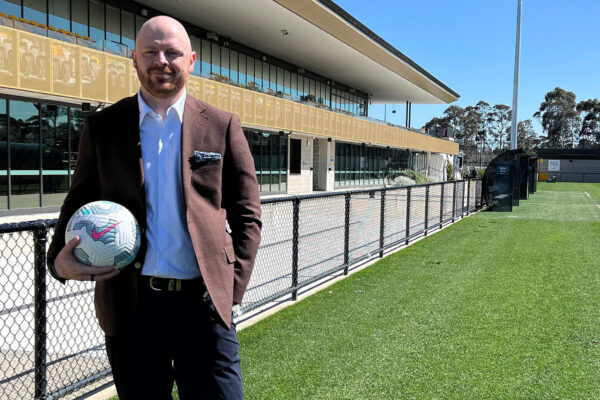
Founded from Genoa in 2004, Wyscout is an international platform based in Italy which specialises in football scouting, transfer dynamics, and match analysis – regarded as one of the most used technological services in football.
Matteo Campodonico, a co-founder of Wyscout, is a former amateur footballer in Italy and upon early retirement was inspired by his playing days and his coach’s methodology. Along with Simone Falzetti, they brought Wyscout to life.
Initially, along with their colleague Piermaria, they started with filming and editing local matches – with the emergence of DVD softwares in 2004, they turned their hobby into an international business platform. Wyscout was started with the purpose to provide a set of innovative technological products for video data editing along with information on players, competition, matches, and plenty more. Through these products, football organisations are able to have an advanced view of athletes’ performances, trends of play, strategy, and more.

Since 2004, they have been pioneers in providing video analysis tools and digital databases for football operations and have aided coaches, teams, and players in their performance as well as in dealing with the football world.
Wyscout possesses one of the widest football video archives in the world, ensuring they have the most advanced information on football matches, players, teams, and competitions. This extends to major European leagues such as Premier League, Bundesliga, Ligue 1, La Liga, and Serie A, through to various youth competitions. Across the globe, more than 250 football completions are analysed. Over 200 football games are uploaded every week and Wyscout analysts segment the match data into thousands of short and easy-to-find video clips. Professional reports, rankings, searching tolls, and other advanced statistics enable football organisations to track and measure every detail.
Wyscout’s services include providing information, statistics needed to organise the day-to-day operations. Performance Analysts can measure and analyse players’ development, while heads of scouting can build travel schedules for scouts across the globe with the help of Wyscout data. Football organisations can monitor and plan to optimise their performance.
Wyscout data enables clubs to analyse opponents and individual matchups along with, managing events and enhancing the capabilities of technical teams. Advanced search situated on Wyscout’s innovative database after analysing a large amount of data in a few quick seconds offers over 100 filters to find the right player.
 Through Wyscout data, clubs can use this for websites and social media to create content based on stats of any player, team, and coach’s performance. Integration of communication mechanisms, along with developing technical skills, is made easier by the constant update of data after every match. Coaches and video analysis teams are able to share videos, data, stats, etc with all technical staff within the football club ensuring, efficiency and alignment of the club’s vision for future outcomes. Adjusting and comparing numbers and videos at any time during the season ensures accurate analysis for any occasion to micro-manage players’ performance and work with them to develop it.
Through Wyscout data, clubs can use this for websites and social media to create content based on stats of any player, team, and coach’s performance. Integration of communication mechanisms, along with developing technical skills, is made easier by the constant update of data after every match. Coaches and video analysis teams are able to share videos, data, stats, etc with all technical staff within the football club ensuring, efficiency and alignment of the club’s vision for future outcomes. Adjusting and comparing numbers and videos at any time during the season ensures accurate analysis for any occasion to micro-manage players’ performance and work with them to develop it.
Wyscout allows football clubs to process travel schedules, policies, agendas, medical exams, training, diet programs, etc and can be integrated into internal software to improve efficiency. Scouting networks have access to high-quality analysed data of over 450,000 football players and over 220,000 catalogued games. Wyscout’s range of products aids clubs and football federations to create one digital database for videos, stats, and player/competition/match information.
Federations and clubs in minor footballing countries can create private archives to store statistics and other data, ensuring the development of technical elements of any minor/youth tournament and league across the globe. This provides custom resources for referee federations to improve adaptability and preparedness to games along with promoting and managing player portfolios to push clubs and federations to build a good network list.
Wyscout’s talent centre products are designed to collect data of under 21 players who have played in the first team for at least 20% of total minutes in the current season. This provides clubs and organisations to scroll through lists of debutants and analyse reports from the best youth and be able to discover the best young talents in the world – along with browsing global talents by filtering values like geographical region, birth date, market value, minutes, and matches played and plenty more.
Overall Wyscout is intuitive, smart, easy, and has evolved since its inception in 2004 to enhance the performances of the teams, day by day. Wyscout has an established structure and stands on the pillars of innovation and technology.
Over its course, Wyscout has become the reference point of football professionals and emerged as an enormous digital footballing database that has contributed massively to the globalisation of football.














